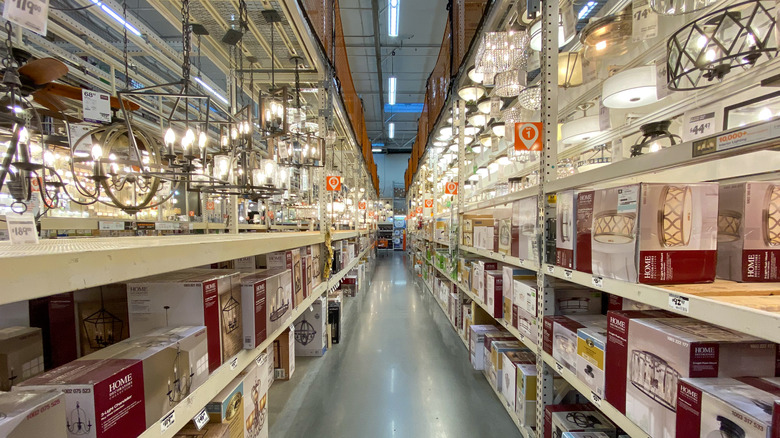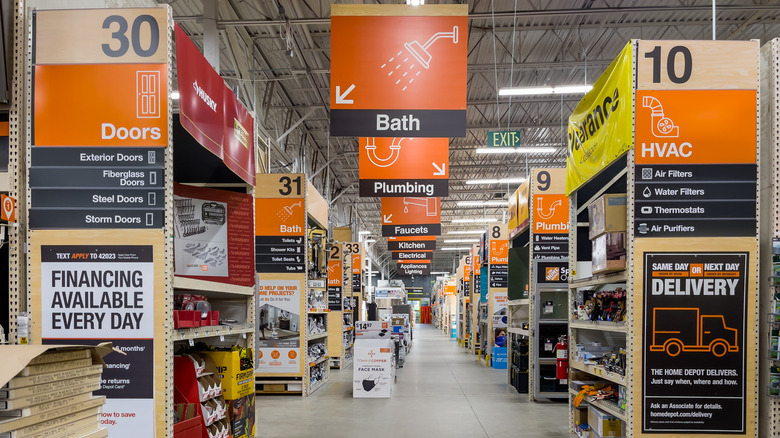Home Depot Or Ace Hardware: Which One Is Better?
Home Depot and Ace Hardware have both been frontrunners in home improvement for decades, being the go-to destinations for countless contractors and homeowner DIYs. However, there are actually some significant differences between these competitors. When Home Depot opened over 20 years ago, it was an exciting thing as there wasn't anything quite like it. Prior to that time, one would have to go to a traditional lumberyard and hardware store to check off boxes on their home improvement list. It was an intimidating environment for anyone who was inexperienced with manual labor and often a waste of money for those who didn't fully understand the various options between what they were purchasing.
With the dawn of big-box chain stores, life got easier and home improvement more accessible to many. But is Home Depot really the best option out there today? With many competitors, including those like Ace Hardware, going the "mom and pop shop" approach? Between these two big sellers, which one is better?
Big box stores losing touch
When it comes to comparing Home Depot to places like Ace Hardware or even larger chains like Lowe's, one strike against the orange behemoth is the fact that there is evidence showing it's losing touch with its customer base. While smaller stores are able to do more customized inventory, Home Depot often goes with a one-size-fits-all approach to its stock.
As Barron's once quoted that Florida stores were selling snowblowers, while there were beach chairs in Kansas locations with no beaches. This same across-the-board inventory system just didn't work well for a variety of locations, and that leads to customers beginning to feel as if they aren't considered or understood. While Home Depot still brings in plenty of income each year, its initial appeal — a store that's for everyone — begins to wear thin when the shelves are stocked with irrelevant items or misguided product placements.
A hometown feel
On the other side of the corporate aisle, Ace Hardware has really leaned into the personalized vibe that Home Depot often lacks. For some, Ace Hardware feels local, even though it's a chain. Every location is independently owned and very local to its surrounding community. Boy Scouts and Little Leaguers hold tables out front throughout the year, souvenirs are available on displays at each individual store, and all products are appropriate to the region.
Stores that are owned locally also tend to be more plugged into the population. The owners watch children in town grow up, know what businesses are moving into town, and observe families building and remodeling their dream homes. With this comes a sort of charm that Home Depot just can't obtain due to its size. Granted, there are Ace Hardware stores in large cities. While these might not have the shopkeeper that knows everyone's name, you will still usually find that he or she is more personable.
Level of knowledge
Something that is important at home improvement stores of any size is knowledgeable employees. Since this style of store began, the big draw is that anyone can access supplies and improvements regardless of experience in general labor-type projects. On the other hand, this means that customers often walk into the store not really knowing fully what they are doing or what they're getting themselves into with big DIY projects. For these businesses to succeed, employees must be well-versed in a variety of products, methods, and project ideas.
Ace has a reputation for having knowledgeable employees. The shop owners themselves often have loads of experience with home improvement, and those employees who are local to the region will also usually have a wealth of knowledge across the board. Home Depot also quite possibly has the upper hand when it comes to knowledge, as a large corporation is easily able to hire the most knowledgeable and skilled people. Family Handyman reports that Home Depot employees rank higher in helpfulness than other home improvement retailers. But is this always the case? Home Depot employees also tend to be compartmentalized — for example, find a paint department employee cruising through lumber? Chances are he won't be able to help you with any information outside of the realm of paint.
Big box retailers are more affordable
Home Depot might not be as specialized as other home improvement stores, but they tend to be more affordable, which is a big selling point for many. Besides having the lowest prices on certain products, there are other perks as well, like free carpet installation when you spend a certain amount on the carpeting itself.
According to The Krazy Coupon Lady, Home Depot's Special Buy of the Day has a better selection than Lowe's Daily Deal. Home Depot also has better prices on its exclusive brands, slightly cheaper paint, and more coupon access than other stores.
Most Home Depot stores will also price match, meaning that you can't ever really lose money on home improvement projects if you shop smartly at Home Depot. Ace Hardware and other retailers like Lowe's and Harbor Freight have their advantages, but when it comes to price combined with quality, Home Depot comes out as the clear winner.
Serving a different crowd
According to Insider, there can never be a clear across-the-board winner when it comes to Ace vs. Home Depot because they cater to clearly different demographics. Home Depot tends to appeal more to professionals, including contractors, interior designers, and plumbers. Ace Hardware, on the other hand, draws more DIYers.
Home Depot is also the store of choice for millennials. In a recent survey of 1,000 individuals in this age bracket, 64% said Home Depot was their store of choice. This tracks with a generation that is known for liking instant gratification and efficient processes. Is this a fair assessment? Perhaps not. But it does explain why this generation and younger prefer Home Depot, while Ace Hardware caters to an older crowd and DIYers willing to take more time to work on projects.
Home Depot and Ace Hardware both have many advantages and disadvantages. Perhaps the real answer is that one isn't better than the other — as they are both just different, and there's room for both in our retail world.





